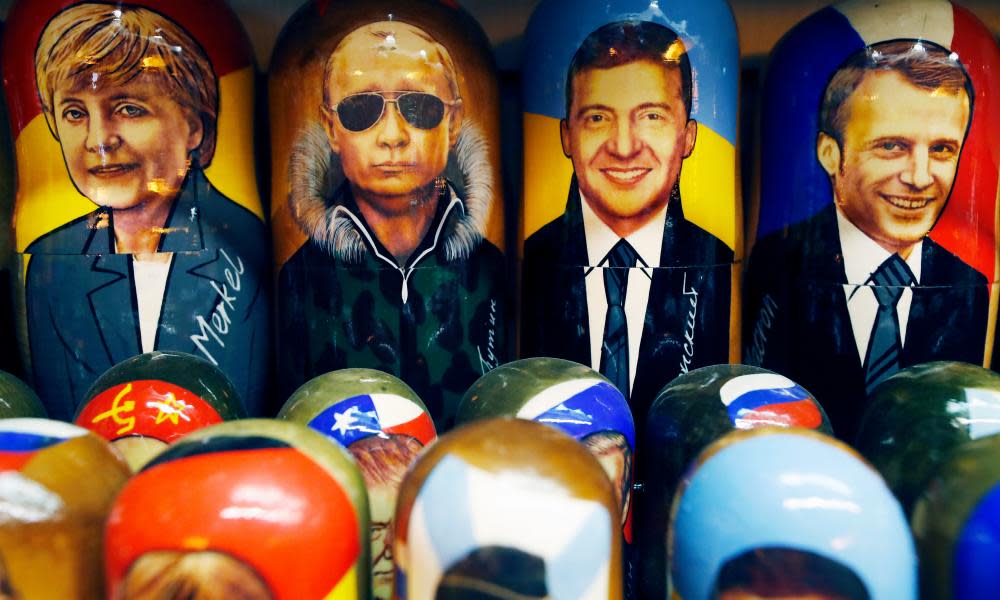Could peace between Ukraine and Russia finally be at hand?

On Monday, half a decade into the conflict in eastern Ukraine, Vladimir Putin sat down with his Ukrainian counterpart, Volodymyr Zelenskiy. Accompanied by Emmanuel Macron and Angela Merkel, they had some reason to declare their meeting a success.
The four may not have brought immediate peace to the region, but they agreed to a complete ceasefire, further disengagement, de-mining, stepped-up monitoring by the Organisation for Security and Co-operation in Europe and a full “all-for-all” exchange of prisoners by the end of the year. All four reaffirmed their commitment to the Minsk Agreements of 2014-2015, a roadmap to peace whose implementation stalled in the face of Moscow and Kyiv’s different interpretations of its components and sequencing. As part of an effort to unfreeze Minsk, Ukraine pledged to incorporate the “Steinmeier formula”, which promises elections in the parts of eastern Ukraine controlled by Russian-backed forces, in a new law on status for those territories. This might not sound like much, but after years of deadlock, the first of these meetings since 2016 represents progress.
Of course, the ultimate success or failure of Monday’s meeting will not be measured by the agreements reached. What matters is whether Ukraine and Russia have the capacity and the will to implement them – and what comes next. Ceasefires have been promised before. A special status law was passed under Zelenskiy’s predecessor, Petro Poroshenko. For this time to be different, the shooting has to stop and Ukraine must develop a clear path to bring the breakaway region back into the fold.
That won’t be easy. Ukraine, which did not start this conflict, faces a choice between continuing to fight a war that kills soldiers and civilians, and the challenging task of reclaiming a region and a population after five years of fighting, mistrust and what increasingly feels like a border cutting the country in two.
While reclaiming the territory and its people is ostensibly what this war has been about, some Ukrainians believe a formal acceptance of the status quo, with the conflict frozen and the territory effectively lost, at least for now, is an acceptable solution. As Zelenskiy negotiated in Paris, protesters in Kyiv stood ready to reject anything he might agree to as capitulation. The opposition to the president is coming from politicians and activists concerned that their new leader is ramming through ill-planned policies, from veterans of the war, and from noxious rightwing groups that threaten armed violence.
Zelenskiy has made all of these groups nervous since he took office in May and started to take steps towards the peace he promised in his election campaign. In October, he vowed to disengage forces at three locations, and publicly accepted a version of the Steinmeier formula. Originally, this set out a road map for elections in the east before Ukraine reclaimed the territory, which would be reintegrated but autonomous. Zelenskiy’s version flipped the order: he demanded reintegration before elections. But his public statement in support of the overall concept reassured Moscow and paved the way for Monday’s talks.
Uncertainty over Zelenskiy’s path to peace is probably one reason he has dropped in the polls. Where he once enjoyed the support of nearly three-quarters of Ukrainians, today just over half think he is doing a good job. While his waning popularity presents challenges, the bigger risk, both to reconciliation and to Ukraine’s overall political stability may come from unrest driven by his adversaries. On Monday, however, this was modest: the protesters in Kyiv dispersed after the press conference, satisfied that their leader did not, in fact, surrender to Moscow.

Zelenskiy is in a decent position to deliver on his promises. He can strengthen his hand by reaching out to the people of eastern Ukraine and reassuring those who live there and those displaced by the conflict that he sees them unequivocally as Ukrainians – something he reiterated on Monday.
But he can’t do it alone. He needs Putin to do his part. Historically, Moscow has argued that it cannot negotiate on behalf of the self-proclaimed leaders it backs in eastern Ukraine. Instead, it wants them at the table with Kyiv. This means that if prisoner exchanges don’t happen, ceasefires don’t hold, and OSCE monitors remain constrained in their movement, Moscow can say that it’s not responsible.
But if Russia’s negotiating position has remained hardline, the Kremlin has much to gain from an end to the war. Over the last five years, EU member states have demonstrated that they need signs of progress to ease or lift the sanctions they imposed on Russia when the conflict began. Keeping de facto statelets afloat in east Ukraine is expensive, and peace means representation in Kyiv for Russian-speaking eastern Ukrainians. Progress on peace would ease the path to the gas deal with Ukraine that Moscow needs to maintain its exports to the rest of Europe. As for claims that it cannot speak for its proxies, their existential dependence on Russian military and financial support gives Moscow substantial leverage, which it has exercised in the past. If Moscow decides it wants peace, it can deliver it.
The four leaders plan to meet again in four months. Assuming that happens, they will then have to start talking properly about the steps needed to make Minsk, and peace, a reality: elections, control of the border and amnesties. The coming months will be a test: if the parties do actually implement what they agreed this week there will be far more cause for optimism that this conflict can finally come to an end.
• Olga Oliker directs the Europe and Central Asia programme at the International Crisis Group

 Yahoo News
Yahoo News 